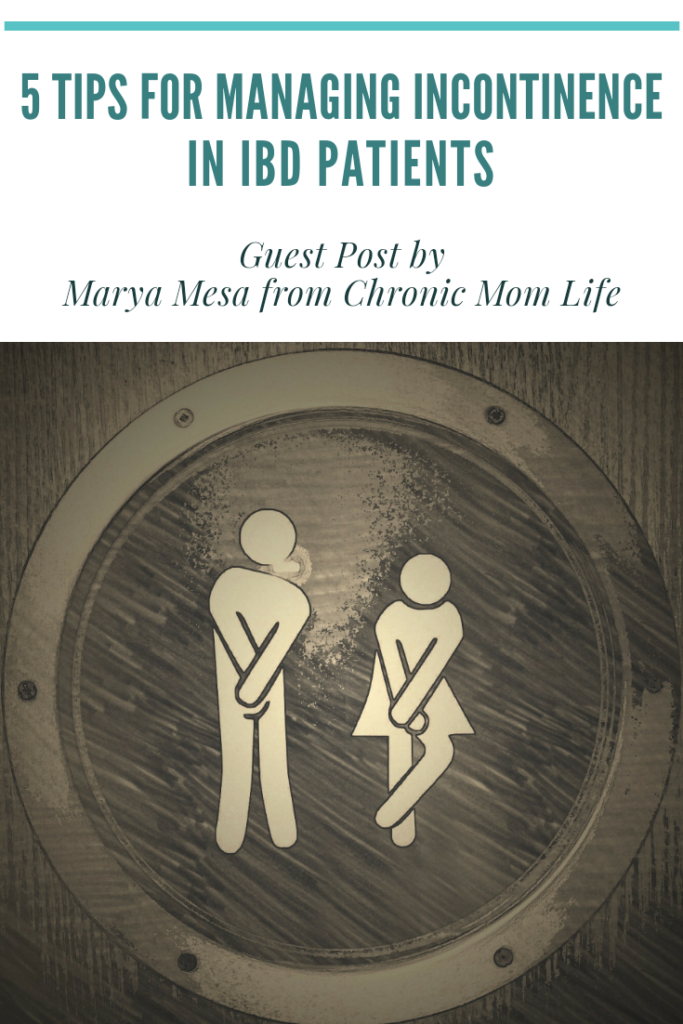
A few weeks ago I wrote a post detailing my experiences with chronic constipation and IBS, called ‘Let’s talk about poo‘. This post was the first in a series designed to take the embarrassment out of pooing, and break the stigma around digestive disorders.
The second installment in the series is a guest post written by Marya from Chronic Mom Life. Marya discusses life with Ulcerative colitis and offers tips for managing incontinence.
Inflammatory bowel disease (IBD) is a lifelong condition with no cure. One of the most embarrassing aspects of living with it (whether Crohn’s Disease or Ulcerative Colitis) are the occasional bouts of diarrhoea, stomach cramps and incontinence. It usually strikes with little to no warning, leaving patients just minutes to locate a bathroom.
The first time it happened to me was when I passed out in a restaurant after a colonoscopy. When I went to the bathroom in the hospital I discovered what happened. I was completely mortified.
Almost two years after that diagnosis, I’ve had to resign myself that it’s an occasional part of this diagnosis and that instead of stressing myself about it, to plan ahead for the possibility that it could happen. Here are my tips for managing incontinence:

1. Acceptance. I have ulcerative colitis and part of living with this diagnosis is occasional incontinence. No matter how strictly I follow my diet and protocols, it can and will still happen. I can either choose to become a recluse or try to live my life and plan accordingly.
2. Know Your Triggers – Know your body. Find out what your safe foods are. Keep a food journal so that you can figure out what foods or drinks could be setting you off. It could even be combinations of foods. Other possible triggers could be coffee, walking and stress. If you know you’re going to be running around, it’s a good idea to eat as minimally as possible beforehand,
3. Prepare. I have a backpack prepared with everything I could possibly need in the toilet when I’m out and about. That includes:
- A pair or two of adult Pull-ups (Depends)
- A spare pair of underwear
- A pair of Leggings
- Wipes
- Poo Spray
- Clorox Wipes
It’s a pain to lug that backpack around some days but I have the peace of mind of knowing that I can take care of an episode when it happens.
4. Tell your spouse and close friends. It’s okay to talk about it. Let the people close to you know that this happens. Shame and stigma thrive in the dark and will make you feel even worse. Those who really care for you are not going to be put off by it.
5. Enjoy Your Life. Nobody wants to deal with this side effect of IBD but if we let it isolate us, we’re letting the disease run our lives and could increase the risk of depression. Plan ahead and do what you love.
Many people with IBD live positive and fulfilling lives. Be sure to talk to your doctor about your current symptoms and how they affect your life. Together, you can take your life back from debilitating symptoms and give you the freedoming to live your life your way.

For more personal stories, reviews, news, inspirational quotes and in-depth discussion, please head over to my Facebook page.

Perfect and greet attitude!
I so get the backpack in my working days my trolley bag had all of the above in it, now my backpack has the same, I just prepare for the unexpected it’s the only way….